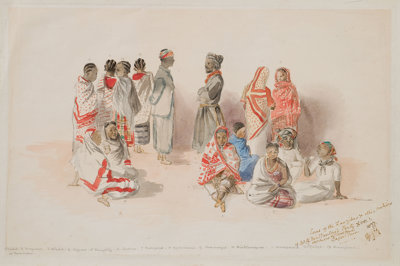There is an increasing critical awareness around continued structural racial inequalities in contemporary society, heritage interpretation and historical representation. This awareness is not to be seen as something inhibiting our use of historical archives - instead, it can energise studies and suggest different ways of reading the record of exploration that challenge and inspire. In this view, white Europeans cannot claim sole ownership of the narratives of British travellers and missionaries to Africa in the nineteenth and early twentieth century given how vital African people were to their journeys. Our critical geographical knowledge has been produced by black lives too.
This online exhibition draws on the images and illustrations held in the Society’s archives. It asks that we look at the representations of African lives that were collected, and see the “power in the story of individual people”. The names of many of these people were never recorded or have been lost to time.
We do not wish to ventriloquise African peoples or their histories. The creators of this exhibition will never be able to experience the subjective power dichotomy from the side of the colonised. The exhibition acknowledges the work of countless African caravan workers, cooks, stokers, assistants and porters upon whose backs these journeys were made; the mute pathfinders with loud voices.
Note: The images used reflect the cultural beliefs, distortions, and prejudices of their time and may contain language or material that will upset or distress some viewers.
This research was facilitated by Wiley Digital Archive.
View the exhibition
Tip: For the best experience, we recommend viewing the content below in full screen mode - press F11 on Windows (press F11 to exit) or Ctr+Cmd+F on OS X (Apple) to enter full screen mode.
About the curator
Kate Simpson is a Lecturer in Digital Humanities at the University of Sheffield. She is a Trustee of the David Livingstone Birthplace Trust and an Associate Project Scholar and UK Outreach Director for Livingstone Online.
She was previously a Lecturer in Information Studies in the School of Humanities at the University of Glasgow, and a fellow at the Institute of Advanced Studies in the Humanities at Edinburgh University. Her recent research project entitled Boundaries of gender: ‘petticoat governments’ and secondary voices in nineteenth century European expeditions of Africa mines digital content to foreground the many women, both European and African, who assisted and enabled David Livingstone (1813-1873) in his journeys in Africa.
Email: kathryn.simpson@sheffield.ac.uk
Further reading
For further information on the written, visual and material legacies of David Livingstone (1813-73) and the study of African history, the British Empire, 19th century intercultural encounters, and digital humanities practice visit the online resource Livingstone Online.
Note about captions
Within the Society’s Collections there are some historical images (and image titles or captions) which are recognised as containing unacceptable forms of language, or present image content that is considered inappropriate. In such cases, as part of its Collections policy, the Society maintains access to those images and descriptors as a source of context and information for researchers, recognising that the historical language used or image subjects in themselves do not reflect the Society’s contemporary position as an organisation wholly committed to principles of equality and diversity.
How to cite
Simpson, Kate (2021). The lost voices in the archive. Royal Geographical Society (with IBG) online exhibition. Available at www.rgs.org/about/our-collections/online-exhibitions/lost-voices-in-the-archive/ Last accessed on: <date>.
